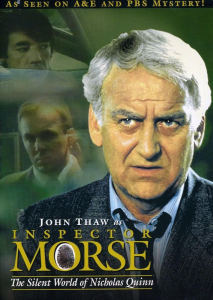
In my youth on the ranch, TV was on a small black-and-white screen with poor sound and foggy images. The children’s productions, except for Sesame Street which was more pedagogical than the entertainment of fantasies, were marred with shouting, excessive laughter, silly stunts, and meaningless comedy. On the other hand, shows like The Lone Ranger and Tarzan were a half-hour of male violence, racism, sexism, and ignorance. Even at a very early age, I knew the elephants were Indian, not African!
TV is enjoyable when it provides for personable entertainment, reflection. and curiosity. Not when it stirs up meaningless fantasy. and fears.
I have had such a repulsion with childhood TV that I can not share any of my memories of the shows with my wife or children.
So it is not surprising that I did not bother with TV shows until they became more sophisticated and less juvenile.
 I frequently watch Inspector Detective Morse solve crimes in a gentlemanly sophisticated manner. While unravelling the plot I find myself sitting with him at the bar while he drinks a beer. At home, I saluted with a Guinness or a single malt scotch.
I frequently watch Inspector Detective Morse solve crimes in a gentlemanly sophisticated manner. While unravelling the plot I find myself sitting with him at the bar while he drinks a beer. At home, I saluted with a Guinness or a single malt scotch.
Traveling with him to a murder scene, I looked forward to the classical music from the Jaguar Mark 2 dashboard. Although musical background was composed by an Australian, it reminded me of Handel, Bach, Mozart, and Hayden among others. The classic Jaguar was more comfortable for its aesthetic design than the wide-open Pontiac or shrunken VW And though it had a powerful engine, it was never displayed by chasses through streets with squeals of rubber tires or imperviousness to bullets from gun fights.
Even more important to my self-worth, he was not a super athletic model like James Bond or Tarzan. Rather he was the model of a bourgeois English gentleman who seemed to be in the wrong profession. He did not have a gun, never struggled anyone to the ground, and did not make moronic challenges like “Make my Day.” In fact, he ran more like a goose than a horse while chasing a suspect.
What made his investigations most interesting to me is that the case of murder always involved a deep historical context. Sometimes we went back centuries. Or we became involved in a complex set of human sympathies and interactions without horrifying behavior. In other words, I learned about English society and traditional behavior.
Colin Dexter who created this detective’s adventures projected his own spiritual feelings into Morse. The Inspector, who had a Quaker mother, was familiar with the Bible but rarely cited God or the commands of Heaven in his adventures. Both Dexter and Morse ended their careers as humanistic atheists. I felt very much at home with the author and his creation.
For me as a Professor who taught Family History, I was fascinated that we never knew his first name.
It seemed to be “Endeavor” named after a famous British warship. But that seemed unlikely. His surname “Morse” was a fairly common aristocratic family name from France. The composer of the program’s music also had an enigmatic name: Barrington Phelong, which I thought was and Asian or even possibly Dutch name, was like Morse but for real, a fictive name created by his father.
For me Morse was a relief from both the macho American and the overbearing Brit. It was a relief to be his companion on the way to a murder. And to the calm and sophisticated way he routed out historical evidence of the criminal. I have since enjoyed TV with these attitude.




I was a big Jeremy Brett fan on PBS.
Kevin: glad I have a companion.
Going outside Hollywood for shows is generally good advice. I hear you about how unwatchable most TV is. I spent many years without a TV—my entire twenties for sure—and have missed many popular cultural references as a result. Maybe I should seek out Inspector Morse though.
See the note to Suzy. I misplaced it in my response.
When I read your title, I immediately thought of the show Burke’s Law, which was on from 1963-66, where Burke was a millionaire in the LAPD who traveled around solving crimes in a Rolls Royce. I loved that show! Much more recently I watched Inspector Morse, but I have to say I never noticed what kind of car he had.
I believe we had a common experience. I know I like Mr. Hulot, Monk, Colombo and many French and British films.
YEs, I loved the British cars–Rolls Royce and Jaguars in Hong Kong. Some were taxis. I am spoiled!
As always I enjoyed your story Richard..
Sorry I haven’t heard of Inspector Morse, but I do remember enjoying The Saint and having a big crush on the suave Roger Moore!
yes, both of those are very stereotypical without any empathy or humanism or classical music.
Thanks, Richard, for the nod to PBS and a couple of its better series. I’ll have to pay more attention to those two that you discuss. There is so much to choose from on PBS, and I found myself most interested over the past few years in Shetland and Last Tango in Halifax. I agree about the difference between British and American TV producers in not fearing depicting real-life characters who maybe have a paunch or stoop or wrinkles. I have found Derek Jacobi, Stellan Skarsgard, and Nicola Walker especially engaging.
thank you for broadening my appreciation for PBS.
I loved Inspector Morse for all of the reasons you shared.
I am not familiar with the stories you exhume, but I loved yours! I especially liked the spirit embodied in your title and in the line, “It was a relief to be his companion on the way to a murder.” So quaint. So deliberately bourgeois. So comfy.
Have another cup of tea, or a cognac, on me.
Thank you. I enjoyed your comment.
I enjoyed my cup of green tea while I read your comment.